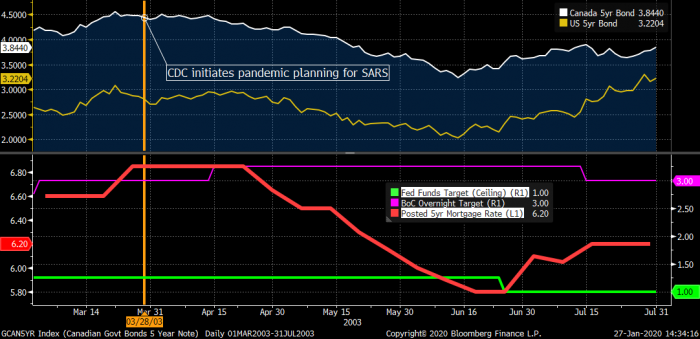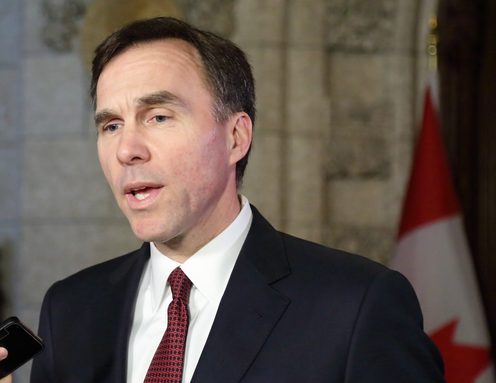Today’s big mortgage headlines…
Coronavirus Rate Sale
Bond yields are getting killed as investors pile into bonds for safety. Traders fear a next coming of SARS (which authorities call the Wuhan coronavirus) could be deflationary. That’s weighing on rates as the inflation outlook is a key rate driver.
Fear of the unknown has shaved 1/4 point off Canada’s 5-year bond yield in just five days. (The 5-year yield leads fixed mortgage rates.) If this downtrend persists, we could very well see widely available fixed-5 rates in the 2.50%-range by next month.
In the 2003 SARS scare, 5-year fixed rates fell over a point—albeit, other factors were acting on rates at the time. Here’s a chart that shows what happened.

Policy Dud: The First-Time Home Buyer Incentive
Only about 3,000 applicants were approved for the Liberals’ First-Time Home Buyer Incentive (FTHBI) in 2019. That’s just $55 million in funding, a less-than-stellar start given its $1.25-billion three-year target.
 No one should be surprised, however. As reported from the get-go, this program:
No one should be surprised, however. As reported from the get-go, this program:
- helps almost no one buy a home (due to the overly strict qualification criteria)
- was ill-conceived (with virtually no industry consultation)
- was a government subsidy for already qualified homebuyers
- was hard to understand for mortgage advisors and consumers alike, and
- made it difficult for borrowers to quantify the benefit (largely because CMHC didn’t initially launch a useful calculator for people to run scenarios).
The government proposed making the program more useful by allowing more people to qualify. But given the rebound in home prices, critics say we don’t need more stimulus. For that reason, this thing remains a policy looking for a problem.
(Source for the above stats: CMHC’s reported comments from TD Securities’ Financial Services Conference.)
MP to Morneau: Get Crackin’
 MP Tom Kmiec is urging Finance Minister Bill Morneau to get moving on Justin Trudeau’s request to review the mortgage stress test. In a letter to the Minster, Kmiec wrote that he wants a “public study” on the stress test, which he says was designed “by Ottawa bureaucrats behind closed doors.”
MP Tom Kmiec is urging Finance Minister Bill Morneau to get moving on Justin Trudeau’s request to review the mortgage stress test. In a letter to the Minster, Kmiec wrote that he wants a “public study” on the stress test, which he says was designed “by Ottawa bureaucrats behind closed doors.”
He accused OSFI of trying to “control market activity” with a “heavy handed” national policy for a largely Toronto and Vancouver problem. Kmiec added that “as many as 18% of prospective buyers are failing the stress test,” presumably citing Mortgage Professionals Canada data.
He said 200,000 jobs will never be created due to the housing slump from the stress test.
Given the mortgage and housing rebound in many areas, however, consumer debt risk is once again top of mind in Ottawa. The powers that be may use that as justification to keep stress test changes to a minimum.
Bank of Canada Buys 10-Year Mortgage Bonds
 10-year fixed rate pricing could get incrementally better. The Bank of Canada announced it will now buy 10-year fixed Canada Mortgage Bonds (CMBs) on the open market for the first time ever.
10-year fixed rate pricing could get incrementally better. The Bank of Canada announced it will now buy 10-year fixed Canada Mortgage Bonds (CMBs) on the open market for the first time ever.
Many lenders rely on CMBs for low-cost mortgage funding to compete with banks. The BoC held over half a billion dollars of CMBs as of Nov 30, 2019. This move should drop yields on 10-year CMBs slightly, resulting in lower 10-year fixed rates for consumers.
The news comes after BoC chief Stephen Poloz suggested last year that policy-makers focus more on facilitating long-term mortgages for financial stability.

 log in
log in
6 Comments
One has to wonder which we should be fearing more…the virus, or the fear itself. Let’s hope things don’t get unnecessarily ugly.
The FTHBI is a boondoggle. I would love to know how much has already been spent on those 3,000 applicants. So much wasted energy, time and money on something that will never gain traction.
The FTHBI was intended to be a vote magnet. Nothing more.
This one does not look good on Siddall’s resume.
Based on the SARS experience I could see the 5 year bond dropping to 1% in the next few months. I also think banks will lower their 5 year posted rate. It’s going to be a hot spring!
So I was wondering how low can rates go? Should I be locking into a mortgage within the next month or be waiting for lower rates?
Best practice is to lock in sooner than later given no one knows where rates will go. You can always reset your rate lower if rates drop (usually with the same lender, or with another lender worst case).
Some will choose to watch bond yields and try to time their rate lock — but that carries some risk for the uninitiated: http://bigcharts.marketwatch.com/quickchart/quickchart.asp?symb=TMBMKCA-05Y&insttype=&freq=&show=